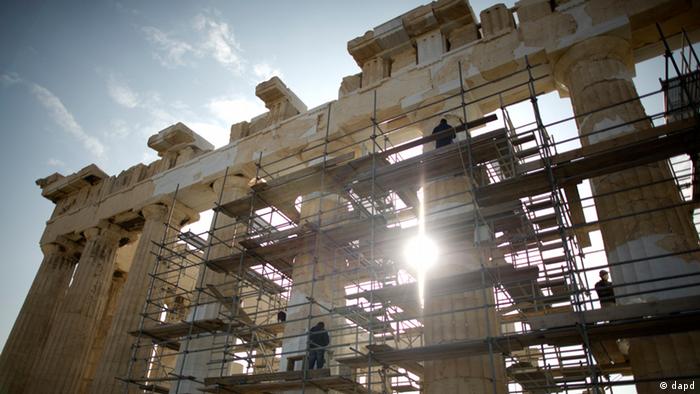Greece's reform process is showing clear signs of lagging as the government requests more time to meet bailout conditions. International lenders are travelling to Greece this week for more talks and inspections.
Greek newspapers are bracing their readers for a visit from the troika of international lenders this week. Officials from the European Union, the International Monetary Fund (IMF) and the European Central Bank (ECB) are preparing to examine Greece's reform efforts closely and, perhaps, mercilessly.
So far, Athens' political class has let a number of reforms slide or pushed them back in light of drawn out elections. Now the troika wants to get down to brass tacks - but will have to do so with a coalition government elected on the promise of renegotiating the terms of the Greek bailout - or at least pushing back its deadlines.
Tax breaks for low-income brackets and the middle class are planned if the bailout terms can be renegotiated. But that could be a reasonable goal with or without a complete renegotiation, says Vassilis Korkidis, president of the National Confederation of Hellenic Commerce (ESEE).
"The troika has set savings targets but largely given us a free hand for realizing them. We can use alternative means of reaching those targets that don't involve constantly raising taxes and fees," Korkidis argued.
Korkidis also believes that lower taxes could have helped stem the rampant tax evasion in recent years.
Structural reforms over pay cuts?
So far, Athens' political class has let a number of reforms slide or pushed them back in light of drawn out elections. Now the troika wants to get down to brass tacks - but will have to do so with a coalition government elected on the promise of renegotiating the terms of the Greek bailout - or at least pushing back its deadlines.
Tax breaks for low-income brackets and the middle class are planned if the bailout terms can be renegotiated. But that could be a reasonable goal with or without a complete renegotiation, says Vassilis Korkidis, president of the National Confederation of Hellenic Commerce (ESEE).
"The troika has set savings targets but largely given us a free hand for realizing them. We can use alternative means of reaching those targets that don't involve constantly raising taxes and fees," Korkidis argued.
Korkidis also believes that lower taxes could have helped stem the rampant tax evasion in recent years.
Structural reforms over pay cuts?

Korkidis opposes further tax hikes on low and middle-income earners
Greek media outlets have reported that the troika could agree to that approach and that the international lenders would appreciate seeing the government adopt structural reforms. Instead of further salary cuts and tax hikes, Athens may look for ways to take wealthy Greeks to task.
The country's new finance minister, Yannis Stournaras, is under pressure from those funding the bailout who want to see the 2012 austerity goals achieved, but Stournaras also sees that introducing new salary and pension cuts across the board will not be politically viable.
Currently, Stournaras is negotiating with his government colleagues on budget cuts to the tune of 11 billion euros ($13.4 billion). The cuts would slim down the Greek government and help appease the members of the troika upon their arrival - perhaps even making them more willing to renegotiate certain terms of the bailout.
A simplified tax system, privatization and incentives for small and medium-sized companies are also under discussion. And it's high time, believes ESEE head Korkidis.
"We hear again and again that the middle class is the backbone of our economy, but in reality, we are just the backbone or our tax apparatus. A simple, long-term tax system would be an important step in the right direction," he said, adding that the value-added tax must be reduced especially for essential food products. Further, Korkidis believes that salaries, taxes and prices need to be brought into some sort of balance.
Currently, Stournaras is negotiating with his government colleagues on budget cuts to the tune of 11 billion euros ($13.4 billion). The cuts would slim down the Greek government and help appease the members of the troika upon their arrival - perhaps even making them more willing to renegotiate certain terms of the bailout.
A simplified tax system, privatization and incentives for small and medium-sized companies are also under discussion. And it's high time, believes ESEE head Korkidis.
"We hear again and again that the middle class is the backbone of our economy, but in reality, we are just the backbone or our tax apparatus. A simple, long-term tax system would be an important step in the right direction," he said, adding that the value-added tax must be reduced especially for essential food products. Further, Korkidis believes that salaries, taxes and prices need to be brought into some sort of balance.

Is international aid for Greece soon coming to an end?
Last-minute aid
Greece's small and mid-sized businesses will get some help from the European Investment Bank (EIB). In Athens over the weekend, bank head Werner Hoyer announced that 1.4 billion euros in guarantee funds will be available to such companies by 2015.
The Greek government will also receive financial aid in August to refinance 3.6 billion euros in bonds held by the ECB. But uproar in Greece followed a report in German news magazine Der Spiegel, which claimed that the boost to state coffers in August will be the last bit of help the country will receive from Europe - and that it could be left to bankruptcy by September.
Leading Greek journalists have disputed that report. They include Giorgos Papous, a financial journalist with the large Athens TV broadcaster MEGA. "On this issue, the Greek finance minister got in touch with high-ranking members of the International Monetary Fund, and they told him that the Spiegel report is not accurate."
The troika will likely first meet with new Prime Minister Antonis Samaras, whose stance on the bailout conditions remains unclear, on July 27. Though the conservative party leader spoke about renegotiating the bailout during the election campaign, he now tends to speak just of amendments to it or of expanding the timeframe.
Experts have said Samaras' pivot could lead dissatisfied voters to turn to opposition leader Alexis Tsipras, who has called for a renegotiation of the bailout agreement. At a meeting for European leftists in northern Greece over the weekend, he explained what he envisions.
"We would head to the EU summit and say, 'Look, people, put your pens down. We are just not going to take part in the austerity politics any more.' And then we would say, 'Either you disband Europe today or we're going to stay in this room and negotiate for three or four days - whatever it takes - to find a way out of this."
Author: Jannis Papadimitriou, Athens / gsw
Editor: Martin Kuebler DW DE
Greece's small and mid-sized businesses will get some help from the European Investment Bank (EIB). In Athens over the weekend, bank head Werner Hoyer announced that 1.4 billion euros in guarantee funds will be available to such companies by 2015.
The Greek government will also receive financial aid in August to refinance 3.6 billion euros in bonds held by the ECB. But uproar in Greece followed a report in German news magazine Der Spiegel, which claimed that the boost to state coffers in August will be the last bit of help the country will receive from Europe - and that it could be left to bankruptcy by September.
Leading Greek journalists have disputed that report. They include Giorgos Papous, a financial journalist with the large Athens TV broadcaster MEGA. "On this issue, the Greek finance minister got in touch with high-ranking members of the International Monetary Fund, and they told him that the Spiegel report is not accurate."
The troika will likely first meet with new Prime Minister Antonis Samaras, whose stance on the bailout conditions remains unclear, on July 27. Though the conservative party leader spoke about renegotiating the bailout during the election campaign, he now tends to speak just of amendments to it or of expanding the timeframe.
Experts have said Samaras' pivot could lead dissatisfied voters to turn to opposition leader Alexis Tsipras, who has called for a renegotiation of the bailout agreement. At a meeting for European leftists in northern Greece over the weekend, he explained what he envisions.
"We would head to the EU summit and say, 'Look, people, put your pens down. We are just not going to take part in the austerity politics any more.' And then we would say, 'Either you disband Europe today or we're going to stay in this room and negotiate for three or four days - whatever it takes - to find a way out of this."
Author: Jannis Papadimitriou, Athens / gsw
Editor: Martin Kuebler DW DE

No comments:
Post a Comment